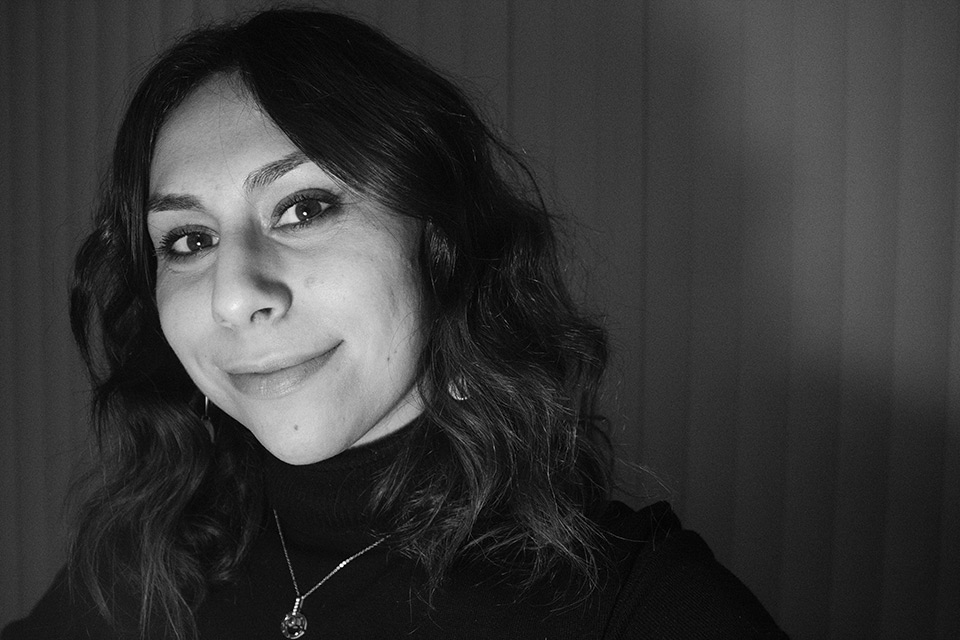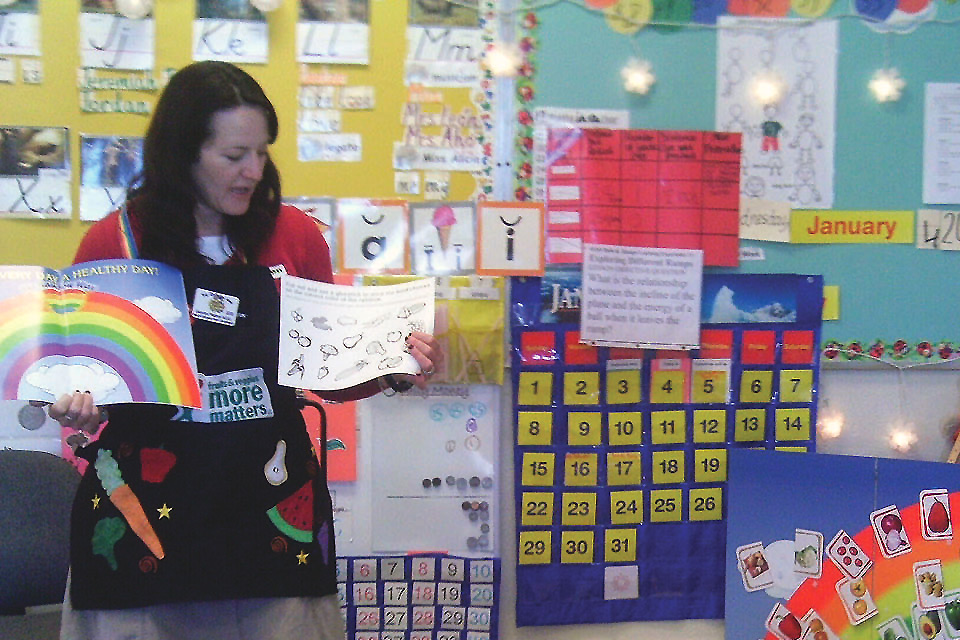Public Health Students Deliver Childhood Obesity Prevention Program to Tucson Middle School

Jedzia Rodriguez
As a public health major in the Mel and Enid Zuckerman College of Public Health (MEZCOPH) at the University of Arizona, Jedzia Rodriguez was excited to be teaching middle school students about the positive health effects of healthy eating and exercise. The opportunity came through a service-learning course that trains public health students to implement a program called Project Healthy Schools (PHS), in local schools. The PHS program is designed to fight childhood obesity, a health challenge that is widespread in Arizona. Rodriguez found the experience to be uniquely rewarding as she saw the middle schoolers begin to understand and consider the health results of different behaviors. At the same time, she realized that the program could be more effective if it were customized for the predominantly Latino students at the school.
Inspired to make a difference in childhood obesity, Rodriguez went to work with Sabrina Plattner, Senior Health Educator, who runs the Project Healthy Schools program, to revise the PHS curriculum so that it would reach Latino students in Southern Arizona more effectively. Revising the curriculum was a long process, and Rodriguez focused on the revisions for an Independent Study course with Plattner in Fall 2019 to get the work done. Even after her Independent Study was over, Rodriguez decided to continue supporting this program update and took on the project for her public health internship requirement. During this time, she created a new version of the PHS program called Healthy Schools Arizona, now oriented for the cultural context of Latino students in Southern Arizona. That is quite an accomplishment for an undergraduate public health student!
The Project Healthy Schools program to prevent childhood obesity and promote whole child wellness was developed at the University of Michigan. The program has five main goals, encouraging participants to 1) eat more fruits and vegetables, 2) choose less sugary food and beverages, 3) eat less fast and fatty food, 4) be active every day, and 5) spend less time in front of a screen. The PHS launched here in Tucson in Fall 2018, implemented by Sabrina Plattner as part of the Childhood Obesity Prevention Initiative (COPI), a program within the Canyon Ranch Center for Prevention and Health Promotion in the Zuckerman College of Public Health at the University of Arizona. It all started with cardiologist and researcher Dr. Frank Marcus.
Decreasing Childhood Obesity in Tucson – How It All Began

Sabrina Plattner, M.Ed
As a cardiologist and internationally recognized cardiovascular researcher, Dr. Frank Marcus from the University of Arizona College of Medicine – Tucson, knew that obesity was at the root of many health problems, especially those related to heart-health. Treating patients daily, he had also observed the increase in obesity among younger patients, and he knew that childhood obesity often led to overweight adults, with a corresponding increase in heart-health problems in adulthood.
Dr. Marcus realized that a program to reduce obesity in youth could have a profound influence on the health of thousands in Southern Arizona. When he heard about a program begun by fellow cardiologist Dr. Kim Eagle at the University of Michigan (UM), a program called Project Healthy Schools, he saw a promising opportunity. The Project Healthy Schools (PHS) program developed at UM works to educate middle-school students about the value of nutrition and exercise to prevent obesity. Obesity prevalence has long been understood as a public health challenge, and after consulting with Dean Iman Hakim, MD, MPH, herself a former pediatrician, in the UArizona Mel and Enid Zuckerman College of Public Health (MEZCOPH), Dr. Marcus realized he had found the right partner – the idea for the Childhood Obesity Prevention Initiative (COPI) was born.
To launch the Initiative, Dr. Marcus provided funding to hire a leader for the Initiative, and was fortunate to find Sabrina Plattner, M.Ed, a professional with years of experience in K-12 health education programs in Arizona. With Plattner to guide it, COPI was established as part of the Canyon Ranch Center for Prevention and Health Promotion (CRCPHP) within the Zuckerman College of Public Health in Spring of 2018. Plattner then traveled to the University of Michigan to receive training on the Project Healthy Schools (PHS) program. Working closely with Cynthia Thomson, PhD, RDN, Director of CRCPHP, Plattner found a local partner school in Tucson and established the PHS program as a service-learning course for public health students in MEZCOPH. The course enables public health students to deliver the PHS curriculum to middle-school youth as they learn about this method of health promotion and program implementation.
Beginning in the fall of 2018, Plattner and her students adapted and implemented the UM’s evidence-based PHP childhood obesity program in a nearby Catholic school, Saints Peter and Paul Catholic Middle School (SSPP). The school, with a diverse student population that is predominantly Latino, welcomed the PHS program. Public health students, both undergraduate and graduate level, delivered the 10-week PHS curriculum and reached over 300 students in grades 6 through 8. Ever since that first semester, the PHP program has been very rewarding for public health students and middle-schoolers alike. In the semesters that followed, the PHS program ran smoothly and was gearing up to expand, until the spring of 2020 when the COVID-19 pandemic hit the United States, and all schools in Arizona shut down in-person classes.
Rodriguez and her fellow MEZCOPH students had begun delivering the PHS program at the Saints Peter and Paul Middle School in the spring of 2020 when the state shut down. The group included public health graduate students Amna Chaundhary, Hannah Martin, Hannah Launius, Alyssa Rankin, and undergrad seniors Gizel Cazares, Diana Gastelum, and Mckenzie Wetherholt. Unable to continue delivering the PHS curriculum to the middle school students, the public health team delivered each lesson to each other on Zoom in order to complete the experience. It was not an ideal solution, but it did push them to process the content knowledge and teach the material so they would be prepared for future programs.
It was during this same time, in the spring of 2020, that public health student Jedzia Rodriguez was still working with Sabrina Plattner to finish creating the curriculum for the Healthy Schools Arizona program to fight childhood obesity, the Arizona-specific version of the PHS program. When the COVID-19 pandemic hit, Plattner and Rodriguez knew they had to adapt and develop a lesson about how to prevent the spread of COVID-19. In addition, they both soon understood the impact that the pandemic was having on households in Southern Arizona, with kids out of school and families stuck at home. Plattner and Rodriguez adapted one of the 8 lesson plans in the Healthy Schools Arizona program to focus on the prevention guidelines, stress, and health challenges caused by COVID-19, a new lesson called “Hygiene and COVID-19.”
Starting this October 2020, Rodriguez and Heena Timsina, a Master of Public Health (MPH) student, will begin teaching the 8 lesson plans that comprise the Healthy Schools Arizona curriculum on Zoom to middle school students from the Saints Peter and Paul School, even though most students are still learning from home. The pandemic has highlighted the importance of public health and, thanks to the persistence of Plattner and Rodriguez, young students will once again be learning the basics of health promotion behaviors.
“I’ve learned so much, and grown so much through this collaboration process to create the Healthy Schools Arizona program,” Rodriguez said, “It has been amazing working with Sabrina (Plattner) and I’m much more of a self-starter now, I’ve had to figure out how to adapt to get it done. I’m excited to see how the new program works, even though we have to teach it online at this point. When kids start asking questions and get engaged, I feel like they’re really starting to understand how choices effect health.” Learning how to be adaptable and a self-starter will serve Rodriguez well once she graduates this December.
The push to establish the Childhood Obesity Prevention Initiative, and to implement the PHP program in Tucson, also sparked community engagement more widely. In 2018, Dr. Cynthia Thomson from CRCPHP brought together UArizona health and wellness faculty for an obesity summit, and invited a keynote speaker, Dr. Erin Hennessey from Tufts University. Hennessey, a widely recognized expert on childhood obesity, is one of the researchers behind a very successful program to prevent childhood obesity in low income communities in Boston, MA. Following that summit, Platter built a relationship with the Tufts researchers, and now Tucson is one of five cities included in a pilot expansion program called “Catalyzing Communities to Prevent Obesity” funded by the Brookings Institution. The regional program, “Catalyzing Tucson to Prevent Obesity,” has brought together stake holders from across Southern Arizona including UArizona faculty, healthcare providers, and government agencies and shows real promise as a regional coalition focused on childhood obesity prevention.
Childhood obesity remains a persistent public health challenge in many communities across the United States, including Tucson and surrounding communities in Southern Arizona. Although he may not have realized it at the time, Dr. Marcus started a regional obesity prevention movement when he funded the Childhood Obesity Prevention Initiative at the Canyon Ranch Center for Prevention and Health Promotion. Within a few short years, hundreds of middle school students have a new perspective on the value of nutrition and exercise, dozens of public health students have learned first-hand about health promotion by delivering the Project Healthy Schools program, and the coalition built around “Catalyzing Tucson to Prevent Obesity” has formed a partnership that will guide and improve obesity prevention efforts in Southern Arizona for years to come. This is the power of public health, to bring people together, to educate and inspire, and ultimately to help our communities lead healthier lives. All of us in the Zuckerman College of Public Health thank Dr. Marcus, Dr. Thomson, Sabrina Plattner, Jedzia Rodriguez, and all the public health students who have contributed for all they have accomplished through the Initiative!

